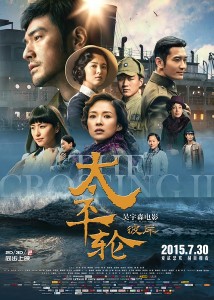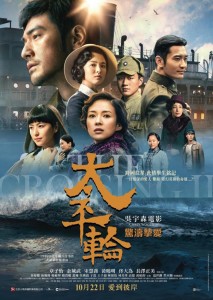The Crossing II
太平轮 惊涛击爱
Hong Kong/China, 2015, colour, 2.35:1, 3-D (China only), 126 mins.
Director: Wu Yusen 吴宇森 [John Woo].
Rating: 4/10.
The second half of the period action drama sinks with almost all hands.
Shanghai, China, 27 Jan 1949. As the Civil War rages in China, and the PLA advances against the Nationalist (KMT) Army, the steamship Taiping sets sail on another journey taking refugees to Jilong [Keelung], Taiwan, with 124 crew, 508 passengers, 300 non-paying passengers, and considerable heavy cargo; it is overweight by 43 tons. Among those on board are medical doctor Yan Zekun (Kaneshiro Takeshi), who had earlier made the same trip to Taiwan but then returned to Shanghai to try to find his younger brother, student Yan Zeming (Yang Youning), who had fled the island to the Mainland after being investigated by the authorities for leftist political activity; penniless volunteer nurse Yu Zhen (Zhang Ziyi), who  has heard her missing husband, Yang Tianhu (Huang Bojun), may be in Taiwan and who has prostituted herself in order to buy a ticket; and Tong Daqing (Tong Dawei), a Nationalist soldier whom Yu Zhen got to know in Shanghai and has since been wounded on the front. Meanwhile, in Taiwan, Zhou Yufen (Song Hye-gyo), who was earlier sent for safety by her husband, KMT general Lei Yifan (Huang Xiaoming), on an earlier voyage of the Taiping, has heard of his death in the Huaihai Campaign which spelled disaster for the Nationalist Army. After colliding in the dark with a cargo boat, the Taiping sinks in 45 minutes, with the loss of almost 1,000 people; 34 survivors are picked up by an Australian warship.
has heard her missing husband, Yang Tianhu (Huang Bojun), may be in Taiwan and who has prostituted herself in order to buy a ticket; and Tong Daqing (Tong Dawei), a Nationalist soldier whom Yu Zhen got to know in Shanghai and has since been wounded on the front. Meanwhile, in Taiwan, Zhou Yufen (Song Hye-gyo), who was earlier sent for safety by her husband, KMT general Lei Yifan (Huang Xiaoming), on an earlier voyage of the Taiping, has heard of his death in the Huaihai Campaign which spelled disaster for the Nationalist Army. After colliding in the dark with a cargo boat, the Taiping sinks in 45 minutes, with the loss of almost 1,000 people; 34 survivors are picked up by an Australian warship.
REVIEW
The seriously iffy, TV drama-like first chunk of The Crossing was little preparation for the debacle of the second half which, like the real-life steamship Taiping in Jan 1949, sinks with almost all hands. Where The Crossing: Part 1 太平轮 上集 (2014) spent over two hours building the backstories of the main characters during the Nationalists-vs-Communists civil war, and didn’t even get to the Taiping leaving port on its final voyage, The Crossing II 太平轮 惊涛击爱 starts with them finally embarking but then spends an hour recapping events of the first movie with just a few extra details. After all that, the over-loaded steamship finally leaves port at the 74-minute mark; at 87 minutes, it hits a cargo boat in the dark; and at 100 minutes, it sinks. The rest of the running time is taken up with the few survivors fighting each other in the water before an Australian warship picks up those still alive.
Though the jury was still out during The Crossing: Part 1 whether Hong Kong director Wu Yusen 吴宇森 [John Woo] – and his fellow scriptwriters, Taiwan’s Su Zhaobin 苏照彬 and Chen Jinghui 陈静慧 – would be able to rescue the whole enterprise during the second part, the final verdict is indisputably that The Crossing should have been a single, two-hour-plus film rather than an over-bloated four-hour extravaganza – a decision seemingly taken on the back of the success of Wu’s two-part costume epic Red Cliff 赤壁 (2008). Aside from the script’s clumsy structure, which makes it hard to care for either the survivors or the dead, especially as they squabble in the water or mouth the corny, melodramatic dialogue, The Crossing II has little sense of climax: the rapid sinking, which took less than an hour in real life, offers little scope for extended drama or heroics, and by that time the audience has already felt cheated after an hour of recaps on material it already waded through in the previous film. Even more importantly, the ship itself builds no identity or geography of its own.
Top-billed Zhang Ziyi 章子怡 is equally low-key and unbelievable here as a penniless volunteer nurse prostituting herself on Shanghai’s docks to get a ticket on the ship; and Kaneshiro Takeshi 金城武 is equally wasted in a soppy role as a doctor torn between family duty (helping his leftist younger brother) and his memories of a Japanese girl he once loved. As a Nationalist soldier, Tong Dawei 佟大为, one of the more sympathetic roles in the first part, spends most his time swaddled in bandages as a war victim, while Huang Xiaoming 黄晓明, the most charismatic character in the first film, is only seen briefly in flashbacks as a heroic Nationalist general. Taiwan’s Yang Guimei 杨贵媚 gets more footage this time round as the conflicted mother of Kaneshiro’s doctor and acquits herself well, as does Taiwan’s Yang Youning 杨祐宁 as her younger son – though neither is part of the shipboard story (which should, given the film’s title, be the main event, no?).
Earning the film an extra point is its fabulous look, all burnished colours thanks to main-unit Mainland d.p. Zhao Fei 赵非 and richly detailed period design by Hong Kong’s Ma Guangrong 马光荣 [Horace Ma] that looks less backlotty this time thanks to the avoidance of Shanghai street scenes. Scoring by Japan’s Iwashiro Taro 岩代太郎 (Red Cliff) is as fulsome as in the first film but evokes no feelings for the characters, while visual effects for the voyage and sinking are fine. Reportedly, veteran Hong Kong director Xu Ke 徐克 [Tsui Hark] was brought in (uncredited) to try to sort out The Crossing II during post-production, but to no avail.
[The original Hong Kong title roughly means “Steamship Taiping: Love Struck by the Raging Waves”. In China, where the film was released first, the title was 太平轮 彼岸 (literally, “Steamship Taiping: The Other Shore”).]
CREDITS
Presented by Beijing Galloping Horse Film (CN), Le Vision Pictures (CN), China Film (CN), Huayi Brothers Media (CN), Yoozoo Entertainment (CN), Beijing Cultural & Creative Industry Investment Fund Management (CN), Dongyang Mighty Allies Movie & Culture (CN), Huace Pictures (Tianjin) (CN), Beijing Phenom Films (CN), China Movie Channel (CN), Galloping Horse Culture & Media (CN). Produced by Lion Rock Productions (HK).
Script: Wu Yusen [John Woo], Su Zhaobin, Chen Jinghui. Original script: Wang Huiling. Photography: Zhao Fei. Editing: Hu Dawei [David Wu]. Additional editing: Yang Hongyu. Music: Iwashiro Taro. Production design: Ma Guangrong [Horace Ma]. Costume design: Chen Tongxun. Sound: Du Duzhi. Action: Sang Lin. Special effects: Luo Lixian [Bruce Law]. Visual effects: Chris Morley (Tippett Studio), Zhuang Yan (Technicolor Beijing), Yang Zhi (Simage VFX). 3-D: Cui Xiaoyu (Cubic). Second unit direction: Liang Baijian [Patrick Leung], Bruce Law [Luo Lixian]. Second unit photography: Shi Luan, Xie Ze.
Cast: Zhang Ziyi (Yu Zhen), Kaneshiro Takeshi (Dr. Yan Zekun), Song Hye-gyo (Zhou Yunfen), Huang Xiaoming (General Lei Yifang), Tong Dawei (Captain Tong Daqing), Nagasawa Masami (Shimura Masako), Qin Hailu (Xia Shan), Yang Guimei (Zekun’s mother), Wu Feixia [Angeles Woo] (Meifang), Cong Shan (Yuan Shenglan, Yunfen’s mother), Yu Feihong (Mrs. Gu, Yu Zhen’s landlady), Yang Youning (Yan Zeming, Zekun’s younger brother), Wang Qianyuan (Major Gu), Lin Baoyi [Bowie Lam] (Peter Yuan, Yunfen’s cousin), Lin Meixiu (Man, Zhou family’s Taiwan servant), Gao Jie [Jack Kao] (Yan Cangmeng, Zekun’s uncle), Huang Baijun [Denny Huang] (Yang Tianhu), Xu Huanhuan (Zhou Qingyun, Yunfen’s elder sister), Zhang Guoqing (Guo), You Yong (Wu Bozhao).
Release: China, 30 Jul 2015; Hong Kong, 22 Oct 2015.
(Read the review of The Crossing: Part 1 here: https://sino-cinema.com/2015/11/29/review-the-crossing-part-1.)
